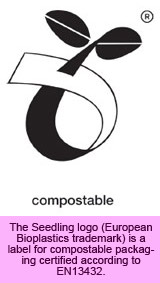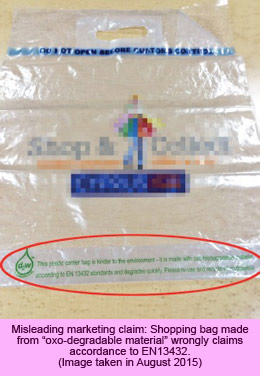European Bioplastics calls out “greenwashing”; misuse of EN13432 standard

Lately, European Bioplastics (EUBP) is observing that producers of fragmentation additives for conventional plastics are falsely claiming that their biodegradable plastics meet the European standard EN13432 for industrial composting, when marketing their products. As is well known, such products do not fulfil the requirements of the EU norm for industrial composting of plastic products. Consequently, the Berlin-based European Bioplastics considers this a severe case of greenwashing.
European standard EN 13432 requires the material to fully biodegrade in less than 12 weeks and sets clear requirements for the surroundings in which this process takes place (industrial composting plant). Simple fragmentation – as is the case of additive-mediated plastics – is not acceptable in the context of EN13432. Corresponding labels, such as the Seedling, prove that the material is truly biodegradable/compostable and certified according to the standard EN13432.
Recent misuse cases comprise the outright false claim that additive-mediated plastics comply with EN13432 (see image). In other cases, additive producers aim to piggyback on the good reputation of EN 13432 by referring to only parts of the standard, for example stating that "the plant growth test and the ecotoxicity effects have been studied with positive results above 100%, according to the EN13432."

"If a standard is referenced, all aspects of it need to be fulfilled by the material or product. Should this not be the case, the reference is misleading. We urge all market operators to comply with communication standards according to the ISO 14020 series," states François de Bie, Chairman of the Board of EUBP.
Worried about the negative impacts on the environment of additive-mediated conventional plastics, which merely fragment into small pieces, the European Commission has discussed banning such technology in the past. Currently, the Commission is undertaking an assessment of the impact of oxo-degradable plastics on the environment, as these materials represent the foremost part of additive-mediated plastics. According to a recent amendment of the EU Directive on Packaging and Packaging Waste, the results shall be presented by 2017, at the latest.
EUBP represents the entire value chain of the bioplastics industry in Europe and defines bioplastics as biobased, biodegradable, or both. In this context, EUBP clearly differentiates between naturally occurring biodegradation and the fragmentation process promoted by additives.
More detailed information about the difference between biodegradable plastics and additive-mediated conventional plastics can be found on the EUBP website: http://en.european-bioplastics.org/wp-content/uploads/2015/publications/EUBP_Background_Additive-mediated_Plastics_2015.pdf
ISO 14020 series compatible recommendations for communication of bioplastic materials are available in the EUBP Environmental Communications Guide: http://en.european-bioplastics.org/ecg-4/
(PRA)Copyright (c) 2015 www.plasticsandrubberasia.com. All rights reserved.










































